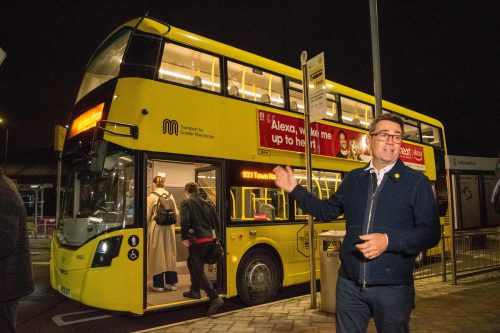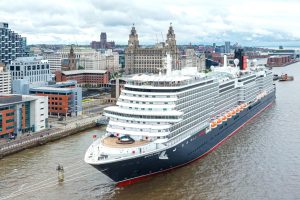Push now on to get passengers up as Greater Manchester takes control of buses

Greater Manchester Mayor Andy Burnham faces his political test since being elected Mayor as control over the bus network started this weekend (September 24, 2023), triggering a campaign to change consumer habits across the city region and get people out of their cars and using buses.
Hailing the long planned for launch of the Bee Network as ”a coming-of-age moment for English devolution”, Burnham needs the subsidised network to see a 30% growth in numbers, especially as £2 capped fares put more pressure on the financial sustainability of the public transport network.
As part of the Bee Network, joint tram and bus travel is now 20% cheaper with a new AnyBus + tram ticket. This comes after the Burnham announced £2 capped adult fares for all Greater Manchester bus services in 2022.
Launching the first bus in Farnworth, Bolton, over the weekend, Burnham said the introduction of locally-controlled bus services marks the first time in England that bus deregulation, which has led to declining bus services and passenger numbers across the country, has been reversed.
But in highlighting the task ahead, he pointed out that in the nearly 40 years since deregulation the number of bus journeys in Greater Manchester dropped from around 355m to 182m in 2019.
Only London where buses were not deregulated, has bus use grown, from around 1,164m journeys in 1986 to 2.1bn at the end of the decade.
Burnham said: “For nearly 40 years we have seen worsening services and plummeting passenger numbers on our buses. We’ve had to reckon with a deregulated bus network that cuts vital services that connect communities to jobs, hospitals and opportunities on a whim – leaving local leaders with limited budgets to pick up the tab to keep these routes alive. Today marks the end of that era with our franchised system representing better value for money for city-regions and a better service for passengers.
“From today passengers will experience our new electric buses as well as earlier and later, more frequent and better integrated services. We’ve already cut the cost of public transport with the capped fares I introduced in 2022, but from today our new AnyBus + tram ticket will also make joint tram and bus travel 20% cheaper.
“We’re also putting power back in the hands of people, with passengers able to rate their journey. These ratings, combined with a range of other customer-related performance targets will be used to inform what operators get paid.
“Today is a coming-of-age moment for English devolution. With the launch of the Bee Network, Greater Manchester is blazing a trail for other city-regions who are ready to follow our lead in reversing the failed bus deregulation experiment and creating an integrated transport network that is run in in the interests of, and accountable to, our communities.”
Operating initially in Bolton, Wigan and parts of Salford and Bury, the launch of the first franchised bus services represents the start of the Bee Network – Greater Manchester’s plan for an integrated, low-cost, high-frequency public transport network, bringing together local trams, buses and bikes – and ultimately local train services – with the largest walking, wheeling and cycling network anywhere in the UK.
Previously in Greater Manchester, like all areas outside of London now, most bus services are provided on a commercial basis by private bus companies, with operators deciding on routes, frequencies, timetables, fares and quality standards.
With operators predominantly targeting the most profitable routes, local authorities have been left to subsidise services in less profitable areas, on average 20% of all services.
Additional subsidy has been required recently to maintain the bus network, including additional funding needed to cover service withdrawals announced by franchised operators in February this year, with similar steps taken to safeguard services due to be withdrawn in autumn 2022. TFGM said the cost of covering these recent service withdrawals is around 30% higher on a per mile basis than the equivalent costs of running franchised services.
Greater Manchester’s ambitions are to increase the number of journeys made using public transport and active travel by one million a day by 2040.
In April 2022, Greater Manchester was awarded £1.07bn from the Government’s City Region Sustainable Transport Settlements (CRSTS) to help deliver Bee Network, with £438m set to be invested to improve buses, routes and services.
Roads Minister, Richard Holden, said: “This Government has worked hard to provide £1.1 billion to boost and decarbonise transport in Greater Manchester with a sustained 5 year investment, almost half of which to support local buses. The launch of the Bee Network is the culmination of our joint efforts with the Mayor to provide local residents with a transport system they can be truly proud of.
“Our unprecedented £3.5 billion investment since 2020 to improve and protect bus services while lowering fares clearly shows that we back our buses, and we will continue working with local authorities and industry. We are delivering a more integrated, sustainable and affordable transport network for the first time in decades and will continue to work with local leaders to do that across the country.”
The Bee Network is being delivered in three phases, with bus services in Rochdale, Oldham, Bury and parts of Manchester, Salford and Tameside to come under local control from 24 March – and the rest of the city-region from January 2025. Transformed bus services are part of a wider plan for a more accessible and integrated network, bringing together buses trams – and ultimately local rail services – with the largest cycling, walking and wheeling network in the UK. Integrating all these modes will enable passengers to make seamless journeys across the public transport network.
Transport Commissioner for Greater Manchester, Vernon Everitt, said: “The return of locally controlled bus services provides the platform for transformation of public transport and active travel in the region. It’s the path to safe, reliable and affordable transport for everyone, growing in a sustainable way Greater Manchester’s economy and productivity and access to new jobs, homes and opportunity.
“As well as a range of service improvements and new cheaper combined bus and Metrolink fares from today, this also represents a move towards London-style ‘tap and go’ ticketing when the final tranche of bus franchising is introduced in January 2025. Integration of train and cycle hire payments will form part of this system as soon as possible after that. The new Bee Network app will also be constantly developed with new features such as journey planning including active travel and lift availability.”
Once franchising is complete in 2025 the ambition is for passengers to be able to touch in and out on any bus or tram service in Greater Manchester and have their fare automatically be calculated up to the daily cap.
Work is also already underway to bring local train services under local control by the end of the decade. The first step will see a payment pilot on train services between Stalybridge and Victoria, and Glossop and Piccadilly that will, for the first time, allow passengers to touch-in and out at the start and end of their journey and have their fare automatically worked out for them.








